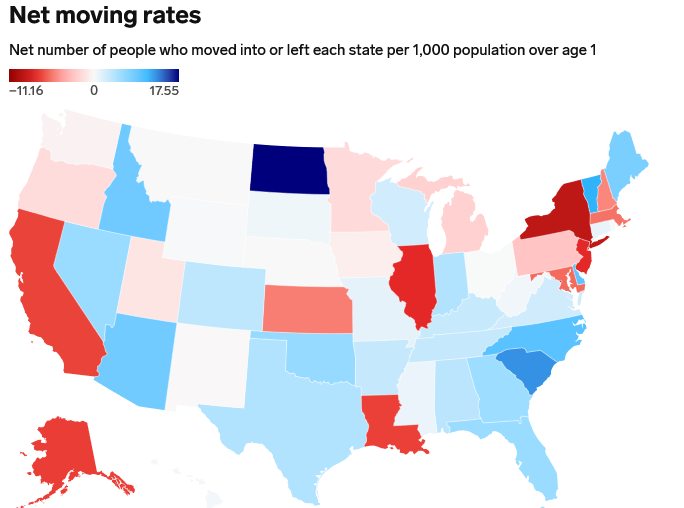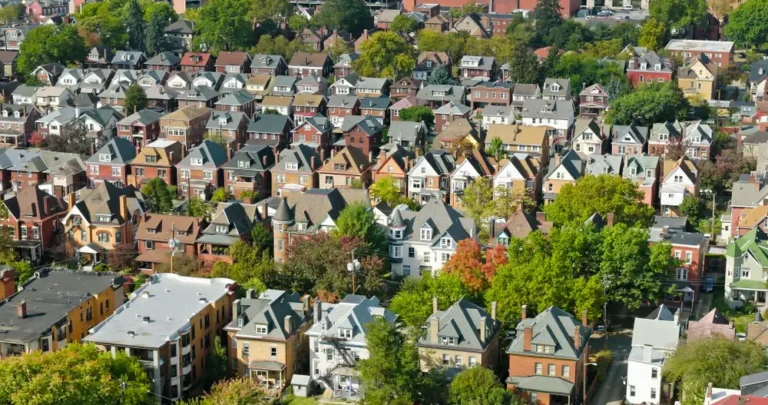Americans moved out of these states the most, flocking to others that were often cheaper and less crowded

Americans leave New York, New Jersey, and Illinois at the highest rates, newly released census data indicates.
Jackie Nguyen left New York for Kansas City, Missouri, in 2020. After a year there, she decided to stay — even though she hadn’t previously considered moving away from a big coastal city.
“Now I feel like I’m a big fish in a small pond. I’ve never experienced that before. It’s cheaper here, and I have a better quality of life,” Nguyen told B-17 in January, when she was 35. “That’s what I want millennials to know. There are huge opportunities in these smaller secondary cities.”
Census data released on October 17 indicates that out of all 50 states, New York recorded the highest rate of people moving away between 2022 and 2023.
More than 481,000 people left New York for another state, while just over 302,800 moved into the Empire State from elsewhere in the US, the data suggests.

The data comes from the American Community Survey, which includes responses to questions concerning moving patterns. B-17 calculated each state’s net moving rate by comparing the number of people who moved into and out of each state per 1,000 people.
Have you moved to a new state or country in the past few years? Please fill out this quick form.
The states people move out of the most
Of all 50 states, New York had the lowest net moving rate at -9.23. (Washington, DC, however, had a lower rate of -11.16.)
The next-most-left state was New Jersey, followed by Illinois, Alaska, and Louisiana.
California was estimated to lose more residents than New York did: 690,100. But because of its larger population and the greater number of movers into the Golden State, California’s net migration rate lands right after Louisiana’s.
The census data illuminates how people tend to move from more expensive to more affordable areas, said Sarah Dickerson, an assistant research professor and research economist at the Kenan Institute of Private Enterprise at the University of North Carolina.
“Over the past couple years, we’ve seen people leaving these big expensive cities, places like New York City, Los Angeles — that typically we think of as magnets for talent migration,” said Dickerson, who studies moving and housing. “We’ve continued to see this trend, in part, because the cost of living and cost of housing is especially high in the Northeast.”
Many movers are drawn to Southern states
Some less-crowded states are drawing a relatively large number of movers.
North Dakota — which has about 780,000 residents to New York’s 20 million — had the highest net migration rate at 17.55. Between 2022 and 2023, 34,415 people moved into North Dakota, while 20,814 left, the census data indicates.
Davrick Hayes, a quality-assurance analyst, told B-17 in 2023 that the high cost of living and long commute times in Los Angeles prompted him to move to Bismarck, North Dakota.
“It’s obscenely cheap to live here and doesn’t require a roommate just to afford a place,” Hayes, then 31, said. “The apartment I first moved into was $800 a month; the same apartment in LA would have been at least $2,500.”
The state drawing movers at the second-highest rate was South Carolina. North Carolina was fourth.
“We’ve seen a lot of people moving to the Carolinas in general,” said Dickerson, who lives in Raleigh, North Carolina. “I think that has to do with the fact there are job opportunities, and there is a lower cost of living than many other areas on the East Coast.”
She added that North Carolina’s midsize cities were luring residents from bigger cities in other parts of the country, while South Carolina is popular with retirees.

Hilton Head Island in South Carolina.
Vermont (with about 650,000 people) and Delaware (with about 1 million) lured a large number of new residents relative to their populations.
Those states probably benefited from denizens of nearby cities — such as Boston, for Vermont, and Washington, DC, for Delaware — being drawn to their relatively cheaper homes and slower pace.
“What we see happening on the East Coast is likely part of that broader theme of cost of living,” Dickerson said. “Cost of housing, in particular, is driving some of the trends that we’re continuing to see in migration.”





